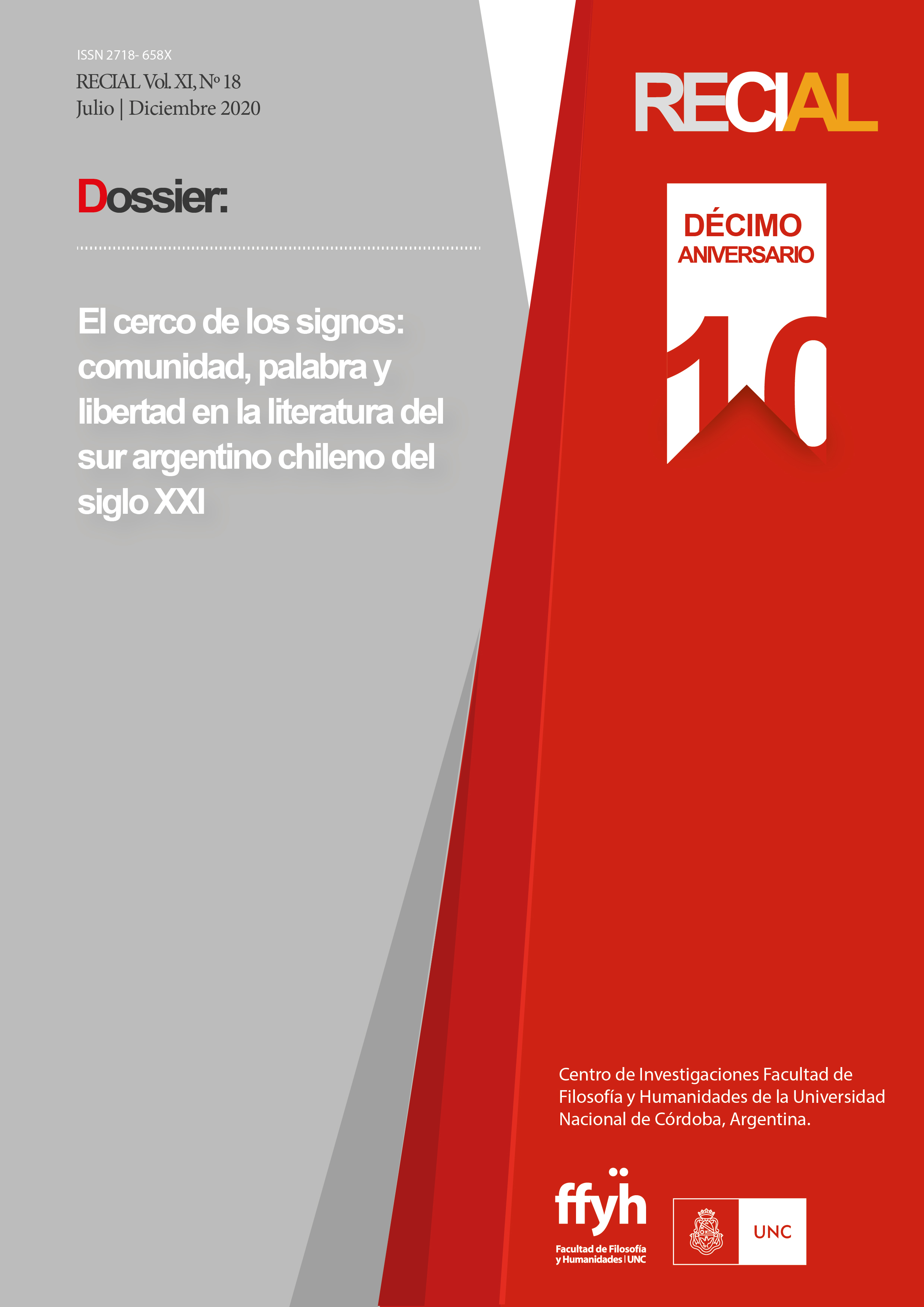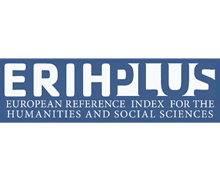Towards a poetics of metamorphosis: canon, norm, margin and their poetic and generic reformulations in Latin literature between the Augustan and the Flavian periods
DOI:
https://doi.org/10.53971/2718.658x.v11.n18.31288Keywords:
canon, norm, margin, diachronic reformulations, poetics of metamorphosisAbstract
Within the framework of the SECyT project (2018-2021), Canon, Norm and Margin in Latin Literature: Poetic and Generic Reformulations from the Augustan Period to the Flavian Period, directed by Prof. Dr. Eleonora Tola and based in the “María Saleme de Burnichon” Research Center of the Faculty of Philosophy and Humanities of the National University of Córdoba, we will give an account of the trajectory of our team and its ensuing research approaches. We acknowledge that the literary genres in Rome respond to a series of elements that, according to their recurrences and groupings, distinguish and characterize each literary genre, posing them as normative constructs. At the same time, these codes involve works and authors that, depending on whether they respond to these standardizations or not, feature as canonical or marginal. However, the coexistence and the interaction between different norms and canons establish inter-generic crossings that, depending on their dynamic nature, reveal a diachronic recasting of their primary literary genres, thus giving rise to a metamorphic process. Therefore, we state that the cultural and ideological issues underlying the augustan, neronian and flavian literature allow us to advance a poetics of metamorphosis.
Downloads
References
Alfonsi, I. (1984). Caratteristiche della letteratura Giulio-Claudia [Características de la literatura julio-claudia]. ANRW, 32(1), 3-39.
Aloni, A. (2009). Elegy. Forms, Functions and Communication [Elegía, formas, funciones y comunicación]. En F. Budelmann (Ed.), The Cambridge Companion To Greek Lyric (pp. 168-188). Cambridge: Cambridge University Press.
Artemeva, N. (2004). Key Concepts in Rhetorical Genre Studies: An overview [Conceptos clave en los Estudios Retóricos de Género: un resumen]. Technostyle, 20(1), 3-38.
Bang, F. P. (2010). Imperial Ecumene and Polyethnicity [La ecumene imperial y la polietnicidad]. En A. Barchiesi y W. Scheidel (Eds.), The Oxford Handbook of Roman Studies (pp. 670-683). Oxford: Oxford University Press.
Barchiesi, A. (1997). The Poet and the Prince. Ovid and Augustan Discourse [El poeta y el príncipe. Ovidio y el discurso augustal]. Los Ángeles-London: Berkeley.
Bessone, F. (2014). Polis, Court, Empire: Greek Culture, Roman Society, and the System of Genres in Statius’ Poetry [Polis, corte, imperio: la cultura griega, la sociedad romana y el sistema de los géneros en la poesía de Estacio]. En A. Augoustakis (Ed.), Flavian Poetry and its
Greek Past (pp. 215-233). Leiden-Boston: Brill.
Bessone, F. y Fucecchi, M. (Eds.). (2017). The Literary Genres in the Flavian Age: Canons, Transformations, Reception (Trends in Classics - Supplementary Volumes) [Los géneros literarios en la época flavia: cánones, transformaciones, recepción]. New York: De Gruyter.
Compagnon, A. (1998). Le démon de la théorie [El demonio de la teoría]. París: Seuil.
Conte, G. B. y Barchiesi, A. (1993). Imitazione ed arte allusiva. Modi e funzioni dell’intertestualità [Imitación y arte alusiva. Modos y funciones de la intertextualidad]. Lo spazio letterario di Roma antica, 1, 81-114.
Devilliers, O. (1989). L‘utilisation des sources comme technique de déformation: le cas de la Germanie [La utilización de las fuentes como técnica de deformación: el caso de la Germania]. Latomus, 48(4), 845-853.
Erll, A. y Nünning, A. (2008). Media and Cultural Memory/Medien und kulturelle Erinnerung [Medios de comunicación y memoria cultural]. Berlin: De Gruyter.
Falconer, R. (2007). Hell in Contemporary Literature: Western Descent Narratives since 1945 [El infierno en la literatura contemporánea: narrativas occidentales del descenso desde 1945]. Edinburgh: Edinburgh University Press.
Fowler, A. (1982). Kinds of Literature [Tipos de literatura]. Oxford: Clarendon Press.
Fowler, D. (2000). Roman Constructions. Readings in Postmodern Latin [Construcciones romanas. Lecturas en latín posmoderno]. Oxford: Oxford University Press.
Galinsky, K. (1989). Was Ovid a Silver Latin Poet? [¿Fue Ovidio un poeta latino ‘de plata’?]. llinois Classical Studies, 14(1/2), 69-89.
Galinsky, K. (Ed.). (2016). Memory in ancient Rome and early Christianity [La memoria en la Antigua Roma y el cristianismo temprano]. Oxford University Press.
Gowing, A. M. (2005). Empire and Memory. The Representation of the Roman Republic in Imperial Culture [Imperio y memoria. Las representaciones de la República romana en la cultura imperial]. Cambridge: Cambridge University Press.
Hamon, P. (1977). Pour un statut sémiologique du personnage [Para un estatus semiológico del personaje]. En R. Barthes (Ed.), Poétique du récit (pp. 115-120). París: Seuil.
Harrison, S. (2002). Ovid and Genre: Evolutions of an Elegist [Ovidio y el género: evoluciones de un elegíaco]. En P. Hardie (Ed.), Cambridge Companion to Ovid (pp. 79-94). Cambridge: Cambridge University Press.
Harrison, S. (Ed.). (2007). Generic Enrichment in Vergil and Horace [Enriquecimiento genérico en Virgilio y Horacio]. Oxford: Oxford University Press.
Hawkins, T. (2014). Iambic Poetics in the Roman Empire [Poética yámbica en el Imperio romano]. Cambridge: Cambridge University Press.
Heidmann, U. (2015). Différencier au lieu d’universaliser. Comparer les façons de (r)écrire des mythes [Diferenciar en lugar de universalizar. Comparar las formas de (re)escribir mitos]. Interférences littéraires/Literaire interferenties, 17, 15-34.
Hinds, S. (1992a). Arma in Ovid’s Fasti. Part 1: Genre and Mannerism [Arma en Fasti de Ovidio. Parte 1: género y manierismo]. Arethusa, 25, 81-112.
Hinds. S. (1992b). Arma in Ovid’s Fasti. Part 2: Genre, Romulean Rome and Augustan Ideology [Arma en Fasti de Ovidio. Parte 2: el género, la Roma de Rómulo y la ideología augustal]. Arethusa, 25, 113-153.
Hutchkinson, G. (2013). Genre and Super-Genre [Género y súper-género]. En T. D. Papanghelis, S. J. Harrison y S. Frangoulidis (Eds.), Generic Interfaces in Latin Literature: Encounters, Interactions and Transformations, Trends in Classics - Supplementary Volumes 20 (pp. 19-34). Berlin-Boston: De Gruyter.
Jauss, H. R. (1978). Pour une esthétique de la réception [Para una estética de la recepción]. París: Gallimard.
Knox, P. (2004). The Poet and the Second Prince: Ovid in the Age of Tiberius [El poeta y el segundo príncipe: Ovidio en la era de Tiberio]. Memoirs of the American Academy in Rome, 49, 1-20.
Lund, A. (1999). Zum Germanenbegriff bei Tacitus [Sobre el concepto de los germanos en Tácito]. En H. Beck (Ed.), Germanenprobleme in heutiger Sicht (pp. 53-87). Berlín/New York: De Gruyter.
Macé, M. (2004). Le genre littéraire [El género literario]. París: Flammarion.
Merli, E. (2000). Arma canant alii. Materia epica e narrazione elegiaca nei Fasti di Ovidio [Arma canant alii. Materia épica y narración elegíaca en Fasti de Ovidio]. Firenze: Università degli Studi di Firenze.
Miller, C. (1994). Genre as Social Action [El género como acción social]. En A. Freedman y P. Medway (Eds.), Genre and the new rhetoric (pp. 23-42). London: Taylor & Francis.
Newlands, C. (1995). Playing with time. Ovid and the Fasti [Jugar con el tiempo. Ovidio y los Fasti]. Ithaca: Cornell University Press.
Newlands, C. (2004). Statius’ Silvae and the Poetics of Empire [Silvae de Estacio y la poética del Imperio]. Cambridge: Cambridge University Press.
O’Gorman, E. (1993). No place like Rome: Identity and Difference in the Germania of Tacitus [No existe lugar como Roma: identidad y diferencia en Germania de Tácito]. Ramus, 22, 135-154.
Papanghelis, T. D., Harrison, S. J. y Frangoulidis, S. (Eds.). (2013). Generic Interfaces in Latin Literature: Encounters, Interactions and Transformations, Trends in Classics – Supplementary Volumes 20 [Interfaces genéricas en la literatura latina: encuentros, interacciones y transformaciones]. Berlín-Boston: De Gruyter.
Pasco-Pranger, M. (2006). Founding the Year: Ovid's Fasti and the Poetics of the Roman Calendar (Mnemosyne Bibliotheca Classica Batava) [Fundar el año: Fasti de Ovidio y la poética del calendario romano]. Leiden: Brill.
Pégolo, L. (2014). Tensiones literarias e ideológicas en la poesía de Aurelio Prudencio Clemente: el Cathemerinon. Buenos Aires: Facultad de Filosofía y Letras, Universidad de Buenos Aires.
Pégolo, L. y Robledo, A. (2017). Voces ovidianas y técnica centonaria en Cupido Cruciatus de Ausonio. Praesentia, 18, 1-14.
Pégolo, L. y Cardigni, J. (2019). Diálogo entre clásicos y tardíos: la construcción del canon literario en la Antigüedad tardía. En A. Manfredini (Coord.), Debates en Lenguas Clásicas, Tomo 2 (pp. 111-142). Buenos Aires: OPFYL.
Pégolo, L. (2020). Nuevas dimensiones narrativas en la poesía de P. Papinio Estacio: El ejemplo de las ‘calendas de diciembre’ en Silvae 1.6. En L. Pégolo y V. Neyra (Coords.), Un milenio de contar historias II : los conceptos de ficcionalización y narración de la antigüedad al medioevo (pp. 51-64). Buenos Aires: Facultad de Filosofía y Letras, Universidad de Buenos Aires.
Pogorzelski, R. (2016). Centers and Peripheries [Centros y periferias]. En A. Zissos (Ed.), A Companion to the Flavian Age of Imperial Rome (pp. 223-238). London: Wiley-Blackwell.
Radiminski, M. (2017). El altar de Júpiter Pistor (Ov. Fast. 6.349-394): un nuevo espacio literario. Argos, 40, 47-68.
Radiminski, M. (2018a). La polivalencia de Germánico en Fasti. Cuadernos de Filología Clásica. Estudios Latinos, 38.2, 175-192.
Radiminski, M. (2018b). Hortus amoenus: Fasti, Flora y una poética espacial. Auster, (23). Recuperado de https://www.auster.fahce.unlp.edu.ar/article/view/AUSe046/10271
Rives, J. B. (2012). Germania. En V. Pagán (Ed.), A Companion to Tacitus (pp. 45-61). London: Wiley-Blackwell.
Rotstein, A. (2016). The Ancient Literary History of Iambos [La antigua historia literaria del yambo]. En L. Swift y C. Carey (Eds.), Iambus and Elegy. New Approaches (pp. 101-121). Oxford: Oxford University Press.
Russo, N. (2020). En las fronteras de la narración. Los Fenni en clave maravillosa en Germania de Tácito. En L. Pégolo y V. Neyra (Coords.), Un milenio de contar historias II: los conceptos de ficcionalización y narración de la antigüedad al medioevo (pp. 175-190). Buenos Aires: Facultad de Filosofía y Letras, Universidad de Buenos Aires.
Schaeffer, J.-M. (1986). Du texte au genre. Notes sur la problématique générique [Del texto al género. Notas sobre la problemática genérica]. En G. Genette y T. Todorov (Dirs.), Théorie des genres (pp. 179-205). París: Seuil.
Schaeffer, J.-M. (1989). Qu’est ce qu’un genre littéraire? [¿Qué es un género literario?]. París: Seuil.
Schiesaro, A. (2011). Ibis redibis. Materiali e discusioni per l’analisi dei testi classici, 67, 79-150.
Seremetakis, N. (Ed.). (1994). The Senses Still: Perception and Memory as Material Culture in Modernity [Los sentidos se aquietan: percepción y memoria como cultura material en la Modernidad]. Chicago: University of Chicago Press.
Tan, Z. M. (2014). Subversive Geography in Tacitus‘ Germania [Geografía subversiva en Germania de Tácito]. JRS, 104, 181-204.
Thomas, R. (2009). The Germania as Literary Text [La Germania como texto literario]. En A. Woodman (Ed.), Cambridge Companion to
Tacitus (pp. 59-72). Cambridge: Cambridge University Press.
Thompson, M. (2007). Primitive or Ideal? Gender and Ethnocentrism in Roman Accounts of Germany [¿Primitivo o ideal? Género y etnocentrismo en los relatos romanos de Germania]. Studies in Mediterranean Antiquity and Classics, 1, 1-20.
Tola, E. (2016a). Écrire l’histoire, redéfinir un genre: la déforestation du bois sacré au livre 3 (399-452) du Bellum Ciuile de Lucain [Escribir la historia, redefinir un género: la deforestación del bosque sagrado en el libro 3 (399-452) del Bellum Civile de Lucano]. En F. Galtier y R. Poignault (Eds.), CAESARODUNUM XLVIII-XLIX bis, “Présence de Lucain” (pp. 197-209). Clermont-Ferrand: Centre de Recherches A. Piganiol – Présence de l’Antiquité.
Tola, E. (2016b). Nefas civil y novitas genérica en Lucano, B.C. 4. Rivista di Filologia e Istruzione Classica, 144, 54-76.
Tola, E. (2016c). Configuraciones de la memoria colectiva de Roma en Valerio Máximo y Lucano. Ordia Prima. Cuadernos de Cátedra, UNC.
Tola, E. (2017a). Gaze, Monstrosity, and the Poetics of History in Lucan [Mirada, monstruosidad y la poética de la historia en Lucano]. PAN: Rivista di Filologia Latina, 6, 115-123.
Tola, E. (2017b). El caos ovidiano como matriz poética del Bellum Ciuile de Lucano: aspectos míticos e históricos del desorden del mundo. Paideia. Rivista di Filologia, Ermeneutica e Critica Letteraria, LXXII, 363-379.
Tola, E. (2017c). El exilio ovidiano o la identidad poética en los márgenes. Praesentia. Revista Venezolana de Estudios Clásicos, 16, 1-14.
Tola, E. (2018a). Alcances poéticos y culturales de una tipología mítica ovidiana. Auster, 23, 47-57.
Tola, E. (2018b). La tempête de César ou la poétique de l’histoire chez Lucain (B.C. 5.476-721) [La tormenta de César o la poética de la historia en Lucano (B.C. 5.476-721)]. En O. Devillers y B. Battistin Sebastiani (Eds.), Les historiens grecs et romains: entre sources et
modèles (pp. 197-209). Bordeaux: Université Bordeaux-Montaigne – Ausonius.
Tola, E. (2018c). Cataclysmes de la nature et limites génériques chez Lucain [Cataclismos de la naturaleza y límites genéricos en Lucano]. En P. A. Caltot, P. Duarte y S. Pétrone (Eds.), La confusion des genres dans la Pharsale de Lucain. Aix-en-Provence: Presses Universitaires de Provence.
Tola, E. (2019a). Nason exilé ou des élégies en quête de lecteurs [Nasón exiliado o las elegías en busca de lectores]. Loxias. Littératures française et comparée 13. ‘Lettres d’exil. Autour des Tristes et des Pontiques d’Ovide’. Recuperado de http://revel.unice.fr/symposia/actel/index.html?id=1234
Tola, E. (2019b). Ille ego sum lignum qui non admittar in ullum (Ov. Pont. 1, 2, 33) ou l’écriture poétique à l’épreuve de l’exil [Ille ego sum lignum qui non admittar in ullum (Ov. Pont. 1, 2, 33) o la escritura poética a prueba del exilio]. Vita Latina, 199, 74-91.
Tola, E. (2020a). Memories of Rome’s Underworld in Lucan’s Civil War Narrative [Recuerdos del inframundo de Roma en la narrativa de la Guerra Civil de Lucano].
En R. Falconer y M. Scherer (Eds.), A Quest for Remembrance. The Underworld in Classical and Modern Literature (pp. 87-107). New York-London: Routledge.
Tola, E. (2020b). Distant Mores, distant mores: Persuading the Reader from the Margins in Tristia 2 [Costumbres distantes, distant mores: persuadir al lector desde los márgenes en Tristia 2]. Arethusa (Special Issue) (en prensa).
Tola, E. (2020c). Fighting for Memory: Poets, Readers, and Texts in Stat. Theb. 12, 797-819 [La lucha por la memoria: poetas, lectores y textos en Stat. Theb. 12, 797-819]. Paideia. Rivista di filologia, ermeneutica e critica letteraria, LXXV (en prensa).
Van Broeck, L. (2017). People, Place, and Power in Tacitus’ Germany [Pueblo, lugar y poder en la Germania de Tácito] (Tesis doctoral). University of London, Royal Holloway.
Verstraete, B. (1983). Originality and Mannerism in Statius’ Use of Myth in the Silvae [Originalidad y manierismo en el uso del mito en las Silvae de Estacio]. L’Antiquité Classique, 52, 195-205.
Published
How to Cite
License

This work is licensed under a Creative Commons Attribution-NonCommercial-ShareAlike 4.0 International License.
Aquellos/as autores/as que tengan publicaciones en esta revista, aceptan los términos siguientes:
- Los/as autores/as conservarán sus derechos de autor y garantizarán a la revista el derecho de primera publicación de su obra, el cuál estará simultáneamente sujeto a la Licencia de reconocimiento de Creative Commons que permite a terceros compartir la obra siempre que se indique su autor y su primera publicación esta revista.
- Los/as autores/as podrán adoptar otros acuerdos de licencia no exclusiva de distribución de la versión de la obra publicada (p. ej.: depositarla en un archivo telemático institucional o publicarla en un volumen monográfico) siempre que se indique la publicación inicial en esta revista.
- Se permite y recomienda a los/as autores/as difundir su obra a través de Internet (p. ej.: en archivos telemáticos institucionales o en su página web), luego de su publicación en la revista. (Véase El efecto del acceso abierto).























